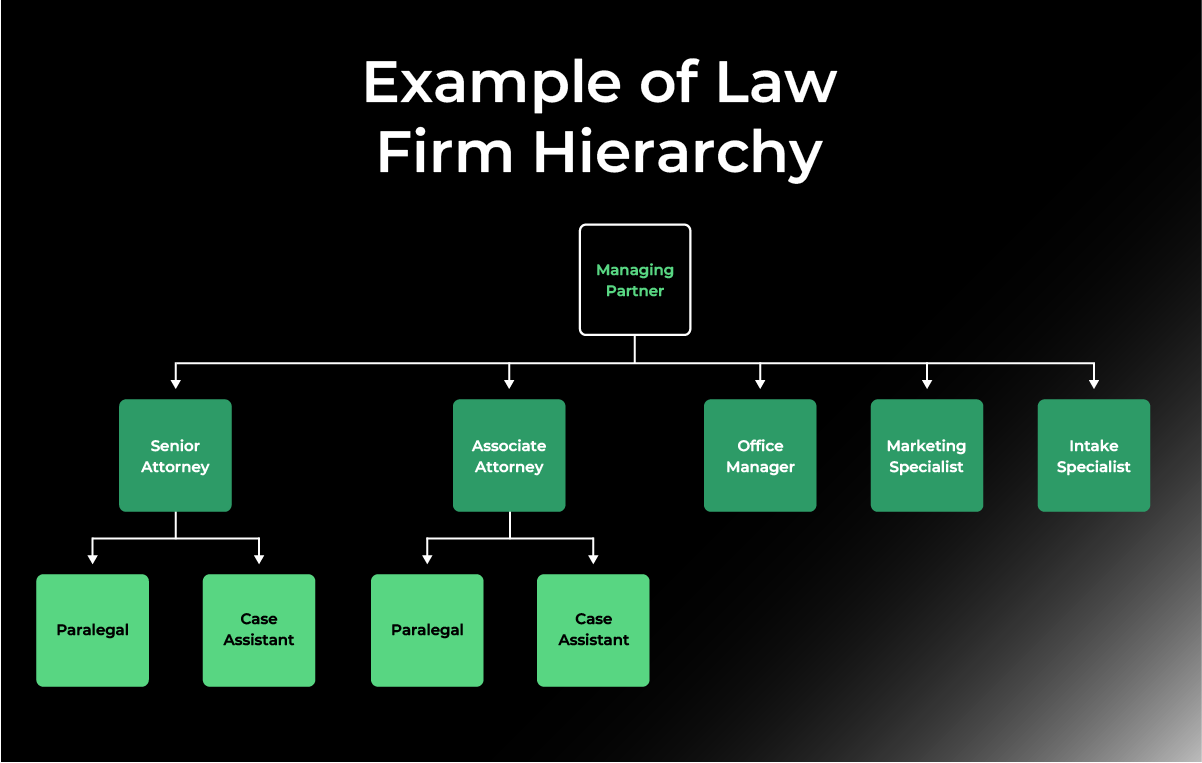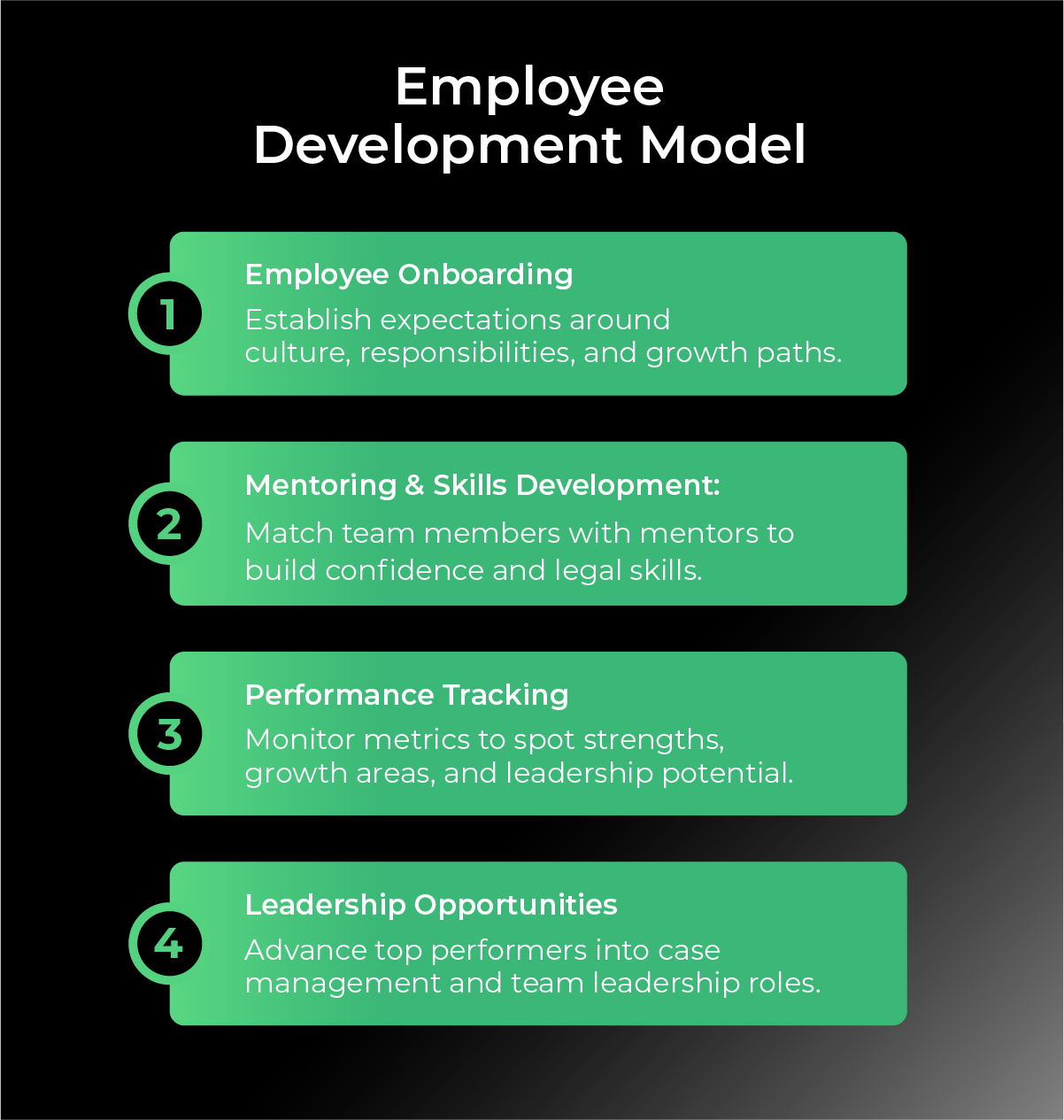The last decade has seen a profound transformation in the way we work, from disruptions like remote work to shifting beliefs about work culture, compensation, and work-life balance overall.
The result has been a spike in employee turnover from which the legal industry is not immune. Recent studies suggest that the attrition rate for law firms currently sits at about 18%, and that rate is higher for women and people of color.
As many in the legal industry find ways to cope with high turnover levels, there are still lingering questions about why so many lawyers choose to move on.
The answer isn’t as mysterious as you might think. Many lawyers note that clear opportunities for career growth and a positive workplace environment are the biggest motivators for sticking with a firm long-term.
In other words, strong law firm leadership has an increasingly meaningful impact on a firm’s long-term success. By embracing these practical and proven attorney leadership strategies, you can help foster innovation, improve retention, and take your personal injury firm to the next level.
Why Great Law Firm Leadership Is More Important Than Ever
How to manage a law firm and how to lead one are two very different things. While many people think of leadership and management as synonymous, there are some subtle but important differences between the two:
Law firm management consists of aligning goals, creating processes, coordinating team members, and measuring outcomes in order to successfully run a law firm.
Law firm leadership is the practice of guiding and inspiring attorneys and staff to achieve professional excellence, uphold firm values, and foster a productive and positive work environment. Successful leaders in a law firm inspire teams, promote career development, and shape the organizational culture and standards that drive success.
Effective leadership sets great personal injury firms apart from the competition, helping to drive law firm growth, employee engagement, and client satisfaction. Setting a clear vision through strong leadership drives innovation and attracts the right talent to your personal injury firm.
However, while evolving team structures, remote work, and legal technology have helped respond to shifting client demands, they’ve also changed the nature of effective leadership.
Creating a Clear Law Firm Hierarchy
Lawyers are highly ambitious and might bristle against a strict chain of command, but having a well-defined law firm hierarchy helps inform leadership and decision-making by establishing clear roles.
This is an example hierarchy for a typical personal injury firm, with managing attorneys at the top, followed by senior attorneys, paralegals, and legal assistants. As a firm grows, it may also hire specialist roles for marketing, intake, and other business operations.

Five Best Leadership Practices for Law Firms
While we can talk in general terms about great leadership for attorneys, what does that mean? In truth, it’s difficult to define. Strong leadership means different things to different firms, and what inspires one team of lawyers may be anathema to another.
However, leadership in successful law firms shares a few qualities. Based on those shared traits, here are five actionable tips that law firm leaders can use to build high-performing, future-ready teams.
Practice #1: Empower Your Team to Own Outcomes
Lawyers take pride in their autonomy and are often driven to demonstrate their capabilities. Excessive oversight can unintentionally signal a lack of trust, which may undermine confidence and motivation. On the other hand, giving your team total freedom to do what they want doesn’t achieve shared goals. Similarly, if you don’t take your hands off the reins every once in a while, you’ll limit your ability to grow.
The solution? Learn to delegate responsibility and empower your teams to own the outcomes. As a leader, it’s your job to know your team’s strengths and weaknesses and which tasks can be transitioned to them. You also know your strengths and weaknesses, and should see delegation to employees as a chance to fill gaps in your skill set.
Remember, your firm is always stronger as a team. Monitor projects as they progress and, most importantly, encourage open communication. Give employees enough freedom to achieve an outcome their way while still feeling comfortable to consult the team when needed.
In other words, empowering employees is not the same as throwing them in the deep end to see if they sink or swim—all that will do is create unnecessary stress and resentment. Learning to delegate effectively can help improve team morale and productivity.
Practice #2: Innovate Your Business Processes
Change is inevitable. Whether it comes from new ways of working, new laws, or new technologies, law firms that don’t embrace change will be left in the dust.
Successful attorney leadership and law firm growth come from embracing change. It’s vital to examine what’s working internally, study your competitors, and encourage constructive conversations between team members.
Always be receptive to new business models and ways of working, especially if you think it will benefit your clients. Many law firms have improved the client experience and boosted efficiency by embracing legal technology.
However, true innovation doesn’t come from doing things just for the sake of it. Instead, every change should be motivated by a specific goal that aligns with your overall vision for the firm.
Practice #3: Inspire by Example and Vision
There are three main reasons employees leave a company (and they rank higher than leaving for financial gain):
Aversion to management style
Feeling unappreciated
Believing they are insignificant to the success of the business
In order to position your law firm for long-term success, you can’t just ask your team to do what you say; you need to lead by example and foster an atmosphere of mutual respect and empathy.
Leading by example is not the same as aspiring to make clones of yourself. Instead, focus on drawing out an individual’s unique strengths and encouraging them to build skills that will help the firm and also help their career.
Put another way, people are more compelled to complete projects if they feel “believed in” by their employers. Employees want to apply themselves and perform efficiently—-they have grown into the role they currently hold and want to continue to develop.
Another essential element of effective leadership is having a clear vision. The worst response you can get when asking why you should do something is, “Because I said so.” Instead, be transparent with your long-term goals for the firm and how everyone in the team helps you achieve those goals.
Don’t just communicate in platitudes, either. Track your employees' performance to understand exactly how their efforts are helping you succeed, and share that performance with the team for shared motivation and goal setting. The more invested people are in your vision, the less likely they will abandon it.
Practice #4: Cultivate Future Leaders Within the Firm
The goal of great leadership in law firms isn’t to lead forever, but to cultivate and inspire the next generation of legal leaders.
Establishing paths for career growth and a clear law firm hierarchy isn’t just to help daily processes run more smoothly; it’s to ensure your employees learn the skills they need to grow and manage the law firm for themselves.
For growing law firms, this is essential as a larger firm won’t require just one leader but a leadership team to thrive. It also helps maintain the law firm’s overall vision over time, while still cultivating new talent and ideas.
Combine your intuition with performance metrics to find emerging leaders in your firm. This approach is also effective for getting an unbiased view of how they can improve.
On a practical level, mentoring employees and helping them grow in their careers helps give them the skills they need to help the firm succeed. However, it also demonstrates your commitment to career growth.

Practice #5: Leverage New Technology and Data
Personal injury is one of the most competitive areas of legal practice, and firms that don’t innovate are doomed to fall behind. To stand out from the competition, lawyers need to embrace advances in legal technology to make meaningful improvements to their processes.
Thanks to their streamlined and automated processes, case management systems have been crucial in helping personal injury law firms meet modern client expectations. However, one area where technology has made the biggest impact is decision-making.
By consolidating time tracking, payments, documents, communication, and other aspects of case work into a single system, you’re generating a treasure trove of invaluable data that you can leverage to cut costs, identify gaps in your processes, and improve the client experience.
Modern legal software empowers personal injury firms to do more by:
Automating intake and follow-ups
Centralizing case data and improving organization
Streamlining communication and notetaking
Tracking law firm key performance indicators (KPIs) to find areas for improvement
After implementing legal software, you can also start to track important metrics like:
Case value and matter type profitability
On-time task completion
Intake conversion rate and lead generation
Case cycle time and utilization rate
Top Law Firm Leadership Training Courses
Very few, if any, people are born leaders. We all have to learn the soft and hard skills that comprise great leadership somewhere.
If you’re a practicing lawyer, finding the time to develop those skills can be easier said than done. Luckily, there are law firm leadership training courses for lawyers who want to expand their skillset.
1. Harvard Law School: Leadership in Law Firms Program
Aimed at lawyers in senior positions, Harvard Law School’s six-day intensive program aims to help you become a more effective leader. They focus on how to foster innovation, develop organizational strategies, master team dynamics, and improve decision-making.
Because it is aimed at managing partners, business unit leaders, and other senior positions, it’s ideal for those preparing for firm-wide leadership roles.
2. UC Berkeley Law: Leadership in the Legal Profession
Compared to other industries, leadership in the legal field is unique due to the distinct personalities and complex practice areas. UC Berkeley’s law firm leadership course is a 10-week course that draws on real-world experience and diverse perspectives to learn legal leadership challenges and managerial approaches.
The course, split into three distinct units, encourages group discussion and practical solutions, making it a great fit for lawyers transitioning from individual contributors to team leaders.
3. The Legal Leadership Project: Leadership Masterclass Series
Thomson Reuters hosted a masterclass on business leadership that gathered expert opinions on maintaining workplace wellbeing and building a positive work culture. While not as specific to the legal field as other courses on this list, the diverse array of opinions on display is invaluable to understanding the challenges of the modern workplace.
This is one of many leadership masterclass seminars that Thomson Reuters offers on demand, making it a great resource for experienced partners who want to level up their leadership skills but have limited spare time.
4. LawPay CLEs: Free Continuing Legal Education
LawPay, a leading legal payment solution, hosts monthly continuing legal education (CLE) seminars on various legal topics. Some of their most recent topics include:
Perfecting legal communication
Immigration under Trump 2.0
How to handle grievances or ethics complaints
Through these courses, lawyers can earn CLE credits, become informed about modern practice management, and gain insights into current trends and essential topics that can help drive innovation and better legal leadership.
CASEpeer is Here to Support Law Firm Leaders
CASEpeer is dedicated to giving personal law firm leaders the industry-specific tools they need to innovate and set meaningful goals for the future of their business. With solutions tailored to boost collaboration, measure firm success, and improve understanding of client needs, CASEpeer is trusted by thousands of firms.
Want to lead your firm with confidence and clarity? Schedule a CASEpeer demo today.
About the author
Justin Fisher is a Content Writer and SEO strategist for 8am, a leading professional business solution. He specializes in writing about emerging legal technology, financial wellness for law firms, and more.

